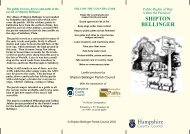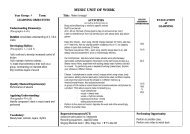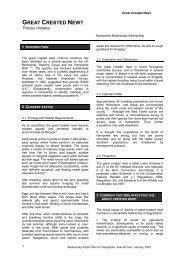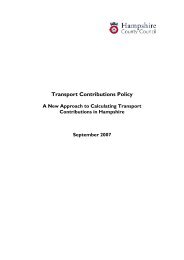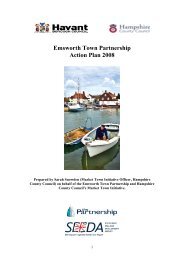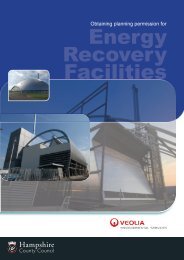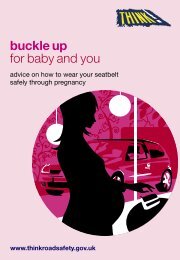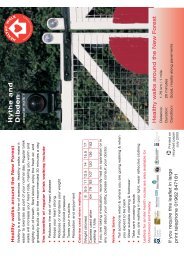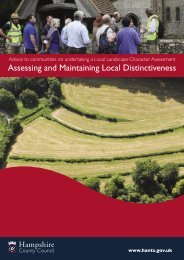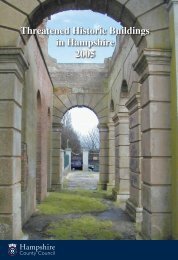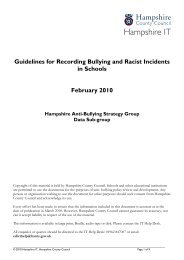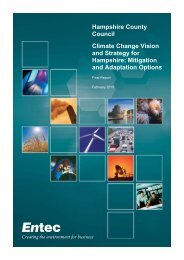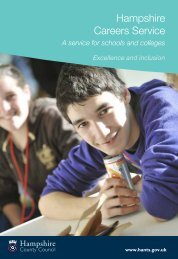Theme : The history of the Olympic and Paralympic Games 2
Theme : The history of the Olympic and Paralympic Games 2
Theme : The history of the Olympic and Paralympic Games 2
Create successful ePaper yourself
Turn your PDF publications into a flip-book with our unique Google optimized e-Paper software.
<strong><strong>The</strong>me</strong> 2 :<br />
<strong>The</strong> <strong>history</strong> <strong>of</strong> <strong>the</strong> <strong>Olympic</strong><br />
<strong>and</strong> <strong>Paralympic</strong> <strong>Games</strong><br />
<strong><strong>The</strong>me</strong> 2<br />
: <strong>The</strong> <strong>history</strong> <strong>of</strong> <strong>the</strong><br />
<strong>Olympic</strong> <strong>and</strong> <strong>Paralympic</strong> <strong>Games</strong>
<strong><strong>The</strong>me</strong> 2<br />
Introduction<br />
This <strong>the</strong>me investigates <strong>the</strong> <strong>history</strong> <strong>of</strong> <strong>the</strong> <strong>Olympic</strong>s <strong>and</strong> <strong>Paralympic</strong>s <strong>and</strong> includes a number <strong>of</strong><br />
different materials to support schools with integrating this <strong>the</strong>me in <strong>the</strong>ir planning.<br />
<strong>The</strong>re is a cross-curricular thought shower. This could be used for a term or half term’s work or<br />
just to ga<strong>the</strong>r ideas from.<br />
<strong>The</strong>re are also six lesson plans which could be used as a unit <strong>of</strong> work to focus on <strong>the</strong> following<br />
elements <strong>of</strong> <strong>the</strong> <strong>Games</strong>:<br />
��<br />
��<br />
��<br />
��<br />
��<br />
��<br />
<strong>the</strong> <strong>Olympic</strong> Rings<br />
what <strong>and</strong> when was <strong>the</strong> first ancient <strong>Olympic</strong> <strong>Games</strong>?<br />
<strong>the</strong> <strong>Olympic</strong> Torch<br />
<strong>the</strong> <strong>Paralympic</strong>s<br />
who started <strong>the</strong> modern <strong>Olympic</strong> <strong>Games</strong>?<br />
controversial issues around <strong>the</strong> <strong>Games</strong>.<br />
For subject co-ordinators, each subject has progressive activities based on National Curriculum<br />
requirements, from KS1 to KS4, around <strong>the</strong> <strong>history</strong> <strong>of</strong> <strong>the</strong> <strong>Olympic</strong>s <strong>and</strong> <strong>Paralympic</strong>s.<br />
Also included is <strong>the</strong> story <strong>of</strong> how <strong>the</strong> London 2012 Mascots came to be, website links to<br />
support this <strong>the</strong>me <strong>and</strong> also an example <strong>of</strong> an assessment worksheet that could be used.<br />
To support this <strong>the</strong>me teachers may wish to use <strong>the</strong> accompanying challenge booklet which<br />
has a general quiz.<br />
be inspired
<strong><strong>The</strong>me</strong> 2<br />
: <strong>The</strong> <strong>history</strong> <strong>of</strong> <strong>the</strong> <strong>Olympic</strong> <strong>and</strong> <strong>Paralympic</strong> <strong>Games</strong>
Timeline <strong>of</strong> <strong>the</strong><br />
<strong>Olympic</strong>s (ordering<br />
numbers).<br />
Financing a major<br />
international event.<br />
What needs to be<br />
considered?<br />
Time<br />
differences<br />
around <strong>the</strong><br />
world <strong>of</strong> <strong>the</strong><br />
<strong>Olympic</strong> hosts.<br />
Mapping<br />
all <strong>the</strong> host<br />
cities <strong>and</strong><br />
researching<br />
key facts.<br />
Compare <strong>and</strong><br />
contrast two<br />
cities that<br />
have hosted<br />
<strong>the</strong> <strong>Olympic</strong>s.<br />
Impact on transport,<br />
networks, electricity<br />
surges.<br />
Greece<br />
locality/climate.<br />
Role play<br />
being Pierre<br />
de Coubertin<br />
travelling around<br />
meeting <strong>of</strong>ficials.<br />
Write a newspaper<br />
article about<br />
your schools mini<br />
<strong>Olympic</strong> games.<br />
Write a persuasive<br />
letter to encourage<br />
all countries to<br />
take part in <strong>the</strong><br />
<strong>Olympic</strong>s.<br />
Symmetry <strong>of</strong> <strong>the</strong><br />
flags <strong>of</strong> <strong>the</strong> countries<br />
that have hosted <strong>the</strong><br />
<strong>Olympic</strong>s.<br />
MATHS<br />
Underst<strong>and</strong>ing<br />
ethical conflict.<br />
Jesse Owens 1936<br />
in Nazi Germany.<br />
Decimal no’s<br />
Race times, ordering<br />
times.<br />
GEOGRAPHY<br />
Women’s<br />
rights<br />
First women<br />
competed in<br />
1900.<br />
LITERACY/ENGLISH<br />
Recounts <strong>of</strong><br />
athletes/Pierre<br />
de Coubertin<br />
about <strong>the</strong>ir life.<br />
Listen to music from<br />
two or three <strong>of</strong> <strong>the</strong><br />
host countries <strong>and</strong><br />
compare.<br />
Compose<br />
Design a national a<strong>the</strong>m.<br />
Influencing <strong>the</strong><br />
beliefs <strong>of</strong> o<strong>the</strong>rs<br />
(first Black <strong>Olympic</strong><br />
winner, George<br />
Poage 1904).<br />
Environmental<br />
impacts <strong>of</strong> 2012<br />
on <strong>the</strong> UK.<br />
RE<br />
Sport <strong>and</strong> media<br />
Positive/negatives<br />
Media influence<br />
<strong>and</strong> coverage, how<br />
this affects <strong>the</strong><br />
athletes.<br />
Commentary<br />
<strong>of</strong> <strong>the</strong><br />
<strong>Olympic</strong>s<br />
<strong>Games</strong>.<br />
MUSIC<br />
Debating<br />
<strong>The</strong> origin <strong>of</strong><br />
<strong>the</strong> <strong>Olympic</strong><br />
<strong>Games</strong><br />
(Wenlock v<br />
Coubertin).<br />
Make <strong>and</strong> record a<br />
musical composition<br />
including dance for<br />
<strong>the</strong> school’s opening<br />
ceremony.<br />
PE/SPORT<br />
Mini <strong>Olympic</strong>s<br />
tournament<br />
(ei<strong>the</strong>r ancient<br />
games or modern<br />
games).<br />
THEME TWO<br />
‘History <strong>of</strong> <strong>the</strong><br />
<strong>Olympic</strong>s <strong>and</strong><br />
<strong>Paralympic</strong>s’<br />
Researching<br />
skills (for example<br />
Pierre de Coubertin,<br />
<strong>Olympic</strong> Rings).<br />
Setup a spreadsheet<br />
to calculate a points/<br />
winners table.<br />
<strong>Paralympic</strong>s.<br />
ICT<br />
Cultural influences<br />
on <strong>the</strong> <strong>Games</strong>.<br />
Why do we<br />
have an <strong>Olympic</strong><br />
Torch relay?<br />
Filming<br />
<strong>the</strong> School<br />
<strong>Olympic</strong>s.<br />
How did <strong>the</strong><br />
modern <strong>Olympic</strong><br />
<strong>Games</strong> start?<br />
HISTORY<br />
Why were women<br />
not allowed to<br />
take part?<br />
Designing poster/<br />
logos/mascots.<br />
History <strong>of</strong> <strong>the</strong><br />
<strong>Olympic</strong> Rings.<br />
MODERN<br />
Why/when/<br />
where did<br />
<strong>the</strong> <strong>Olympic</strong>s<br />
take place?<br />
Design, plan <strong>and</strong> conduct<br />
an opening ceremony for<br />
your <strong>Olympic</strong>s.<br />
ANCIENT<br />
What responsibilities<br />
do <strong>the</strong> host cities face<br />
around <strong>the</strong> <strong>Olympic</strong>s?<br />
Design, plan<br />
<strong>and</strong> make a<br />
3D mascot<br />
sculpture.<br />
ART/DT<br />
Design, plan<br />
make a plan <strong>of</strong> an<br />
<strong>Olympic</strong> village/venue.<br />
Controversial <strong>Olympic</strong>s:<br />
�������������������������������<br />
���������������������������<br />
�����������������������������<br />
(Billy Mills)<br />
�������������������������<br />
��������������������������<br />
How have<br />
<strong>the</strong> <strong>Olympic</strong>s<br />
changed since<br />
�����<br />
What sports<br />
did <strong>the</strong><br />
Ancient<br />
Greeks play?<br />
Rules <strong>and</strong><br />
Laws on<br />
drugs for<br />
athletes.<br />
PSHE/CIT<br />
What would it have<br />
been like to have<br />
competed in <strong>the</strong><br />
First <strong>Olympic</strong>s?<br />
Importance <strong>of</strong> having<br />
an international<br />
event? Advantages/<br />
disadvantages.<br />
Look at technology<br />
through <strong>the</strong> ages<br />
- special materials,<br />
video replays,<br />
equipment.<br />
Create a new<br />
<strong>Olympic</strong> br<strong>and</strong><br />
or company<br />
for an<br />
international<br />
festival <strong>of</strong><br />
friendship.<br />
Design, plan<br />
<strong>and</strong> play a<br />
new game or<br />
sport for <strong>the</strong><br />
2016 <strong>Olympic</strong>s<br />
English links<br />
(instructional<br />
text).<br />
be inspired<br />
Challenging<br />
stereotypes.<br />
Why only<br />
male athletes<br />
to take part?<br />
Link to<br />
controversial<br />
issues -<br />
HISTORY.<br />
What challenges<br />
would Pierre De<br />
Coubertin have<br />
met when trying<br />
to set-up <strong>the</strong><br />
<strong>Olympic</strong>s?
<strong>Olympic</strong> <strong>Games</strong> lesson<br />
planning ideas<br />
be inspired
1<br />
2<br />
<strong>The</strong> first ancient <strong>Olympic</strong> <strong>Games</strong><br />
What <strong>and</strong> when was <strong>the</strong> first ancient <strong>Olympic</strong> <strong>Games</strong>?<br />
Aims<br />
��<br />
To know when <strong>the</strong> first <strong>Olympic</strong> <strong>Games</strong> took place <strong>and</strong> where it was held.<br />
Answer: <strong>The</strong> first ancient <strong>Olympic</strong>s were held in 776BC in Olympia hence <strong>the</strong> name <strong>Olympic</strong>s.<br />
www.bbc.co.uk/<strong>history</strong>/ancient/greeks/greek olympics 01.shtml<br />
�� To know <strong>the</strong> different sports that were undertaken at <strong>the</strong> games <strong>and</strong> <strong>the</strong> traditional ceremony<br />
(Laurel leaves, winners etc).<br />
Answer: <strong>The</strong> ancient <strong>Olympic</strong> sports consisted <strong>of</strong>:<br />
�� boxing<br />
�� wrestling<br />
�� running<br />
�� two equestrian events (chariot racing, riding)<br />
��<br />
�� Pankration Pentathlon (discus, javelin, jump, running, wrestling)<br />
www.perseus.tufts.edu/<strong>Olympic</strong>s/sports.html<br />
To know why women were not allowed to participate in <strong>the</strong> games.<br />
Answer: In <strong>the</strong> ancient <strong>Olympic</strong> <strong>Games</strong>, women were forbidden to take part. In fact, <strong>the</strong>y<br />
were forbidden to even enter <strong>the</strong> competition areas as spectators.<br />
http://ancient<strong>history</strong>.about.com/od/olympics/f/080708<strong>Olympic</strong>Wo.htm<br />
Key questions to ask<br />
��<br />
��<br />
��<br />
��<br />
��<br />
��<br />
��<br />
��<br />
��<br />
When was <strong>the</strong> first ancient <strong>Olympic</strong> <strong>Games</strong> held?<br />
Why was it named <strong>the</strong> “<strong>Olympic</strong> <strong>Games</strong>”?<br />
Who took part in <strong>the</strong> <strong>Games</strong>?<br />
What sports <strong>and</strong> cultural activities were involved?<br />
Were <strong>the</strong> ancient <strong>Olympic</strong> <strong>Games</strong> equal?<br />
Why weren’t women allowed to participate in <strong>the</strong><br />
games?<br />
Why did all <strong>the</strong> Greek states cease fighting during <strong>the</strong><br />
games?<br />
Was <strong>the</strong>re any influence from <strong>the</strong> Greek Gods?<br />
Which <strong>of</strong> <strong>the</strong> <strong>Olympic</strong> or <strong>Paralympic</strong> values does this<br />
incorporate? Why?<br />
<strong><strong>The</strong>me</strong> 2 : <strong>The</strong> <strong>history</strong> <strong>of</strong> <strong>the</strong> <strong>Olympic</strong> <strong>and</strong> <strong>Paralympic</strong> <strong>Games</strong>
3<br />
4<br />
Possible activities<br />
��<br />
��<br />
��<br />
��<br />
Find out about <strong>the</strong> location, climate <strong>and</strong> city states <strong>of</strong> Ancient Greece (map work <strong>and</strong> locality<br />
study).<br />
Research which city states in Ancient Greece took part in <strong>the</strong> games.<br />
Compare ancient sports to those <strong>of</strong> <strong>the</strong> modern <strong>Olympic</strong>s.<br />
Design your own Greek ceremony <strong>and</strong> <strong>Olympic</strong> <strong>Games</strong>.<br />
Curriculum areas<br />
Topic Study<br />
History History <strong>of</strong> Greece, relating to <strong>the</strong> <strong>Olympic</strong>s<br />
RE<br />
Greek gods<br />
Citizenship Democracy – Women’s rights<br />
Geography Map work about Greece <strong>and</strong> climate<br />
Design <strong>and</strong> Technology Designing an ancient style Greek ceremony <strong>and</strong> <strong>Games</strong><br />
ICT Researching using search engines/ E-safety<br />
RRR from <strong>the</strong> UNCRC Articles<br />
be inspired
1<br />
Controversial issues<br />
Have <strong>the</strong>re been any controversial issues around <strong>the</strong><br />
<strong>Olympic</strong>s in <strong>the</strong> past? It is right that some people have tried<br />
to use <strong>the</strong> <strong>Olympic</strong> <strong>Games</strong> to push <strong>the</strong>ir own political ideas?<br />
Aims<br />
��<br />
��<br />
��<br />
To explore an area <strong>of</strong> controversy around <strong>the</strong> <strong>Olympic</strong> <strong>Games</strong><br />
Women’s rights – not allowed to participate in <strong>the</strong> 1896 <strong>Olympic</strong>s.<br />
www.olympicwomen.co.uk/potted.html<br />
www.olympicwomen.co.uk/training.htm<br />
Race <strong>and</strong> equality - 1936 Berlin, Jesse Owens <strong>and</strong> Hitler (DVD)<br />
www.dailymail.co.uk/news/worldnews/article-1205572/Hitler-shook-h<strong>and</strong>sblack-1936-<strong>Olympic</strong>-hero-Jesse-Owens.html<br />
Race <strong>and</strong> culture – 1964 Tokyo, Billy Mills (DVD)<br />
www.basoc.org/basoc2012/board mills b.html<br />
Race, equality <strong>and</strong> civil rights – 1968 Mexico, Black Power Salute<br />
http://news.bbc.co.uk/onthisday/hi/dates/stories/october/17/<br />
newsid 3535000/3535348.stm<br />
www.independent.co.uk/news/world/americas/1968-olympics-<strong>the</strong>-dividedlegacy-<strong>of</strong>-black-power-863932.html<br />
Political issues – 1972 Munich, Black September <strong>and</strong> Israeli Hostages (DVD selected viewing)<br />
http://middleeast.about.com/od/terrorism/a/me080803e.htm<br />
Political issues – 1976 Montreal, African boycott<br />
http://news.bbc.co.uk/onthisday/hi/dates/stories/july/17/<br />
newsid 3555000/3555450.stm<br />
www.cbc.ca/olympics/<strong>history</strong>/story/2008/05/09/f-olympics-<strong>history</strong>-1976.<br />
html<br />
Political issues – 1980 Moscow, boycott over <strong>the</strong> Russian invasion <strong>of</strong> Afghanistan<br />
www.wisegeek.com/what-was-<strong>the</strong>-1980-summerolympics-boycott.htm<br />
Political issues – 1984 Los Angles, Russian counter boycott<br />
because <strong>of</strong> <strong>the</strong> 1980 boycott<br />
http://news.bbc.co.uk/onthisday/hi/dates/stories/<br />
may/8/newsid 2518000/2518931.stm<br />
To know that athletes were put under pressure not to compete.<br />
To know how <strong>the</strong> different events have shaped <strong>the</strong> <strong>Olympic</strong><br />
<strong>Games</strong> as we know it today.<br />
<strong><strong>The</strong>me</strong> 2 : <strong>The</strong> <strong>history</strong> <strong>of</strong> <strong>the</strong> <strong>Olympic</strong> <strong>and</strong> <strong>Paralympic</strong> <strong>Games</strong>
2<br />
3<br />
4<br />
Key questions to ask<br />
��<br />
��<br />
��<br />
��<br />
��<br />
��<br />
��<br />
��<br />
Which <strong>of</strong> <strong>the</strong> <strong>Olympic</strong> or <strong>Paralympic</strong> values does this incorporate? Why?<br />
Why was this controversial?<br />
Was <strong>the</strong>ir cause just?<br />
Which party is being discriminated against <strong>and</strong> why?<br />
Why did <strong>the</strong>y use <strong>the</strong> <strong>Olympic</strong>s to voice <strong>the</strong>mselves?<br />
Is this right?<br />
Are <strong>the</strong>se still issues today? Do <strong>the</strong>y need to be resolved?<br />
Who caused <strong>the</strong> controversial issue? (Country/minority group/person?)<br />
Possible activities<br />
�� You are reporting to <strong>the</strong> UN commission for human rights, you have to construct a case, ei<strong>the</strong>r<br />
for or against (or both), about a controversial issue that needs to be resolved. Research <strong>the</strong><br />
information you need to present.<br />
Curriculum areas<br />
Topic Study<br />
History Controversial issues around <strong>the</strong> games<br />
RE Race, religion <strong>and</strong> cultural issues<br />
Citizenship Democracy – women’s rights, boycotting <strong>the</strong> games, political<br />
dilemmas, countries participation, UNCRC <strong>and</strong> RRR<br />
Literacy Debating, presenting a case<br />
ICT Researching information/presenting skills<br />
RRR from <strong>the</strong> UNCRC Article 2 (Rights without discrimination)<br />
Article 4 (Government to protect rights)<br />
Article 7 (About identity/nationality)<br />
Article 11 (Kidnapping <strong>and</strong> trafficking)<br />
Article 12 (Opinions <strong>of</strong> people)<br />
Article 14 (Freedom <strong>of</strong> thought, belief, religion)<br />
Article 15 (Freedom to join groups/organisations)<br />
Article 16 (Right to privacy)<br />
Article 17 (Media influence)<br />
Article 19 (Protection from violence)<br />
Article 30 (Have own customs <strong>and</strong> beliefs)<br />
Article 31 (To enjoy leisure, play <strong>and</strong> culture)<br />
Article 37 (Detention <strong>of</strong> people)<br />
Article 38 (War <strong>and</strong> armed conflicts)<br />
Article 41 (Respect for better national st<strong>and</strong>ards)<br />
be inspired
1<br />
2<br />
3<br />
<strong>The</strong> modern <strong>Olympic</strong> <strong>Games</strong><br />
Who started <strong>the</strong> modern <strong>Olympic</strong> <strong>Games</strong>?<br />
Was it Pierre De Coubertin or William Penny Brookes at<br />
Much Wenlock in Shropshire?<br />
Aims<br />
�� To know when <strong>and</strong> how <strong>the</strong> modern <strong>Olympic</strong> <strong>Games</strong> started. Answer: 1896.<br />
��<br />
��<br />
��<br />
To underst<strong>and</strong> Coubertin’s role.<br />
Answer: reinvented <strong>the</strong> modern <strong>Olympic</strong>s based on what he knew about <strong>the</strong> Ancient Greeks<br />
http://<strong>history</strong>1900s.about.com/od/fadsfashion/a/olympics<strong>history</strong>.htm<br />
To formalise your own views as to who invented <strong>the</strong> modern <strong>Olympic</strong> <strong>Games</strong>.<br />
www.empower-sport.com/focus/<strong>the</strong>-olympics/48-<strong>the</strong>-origins-<strong>of</strong>-<strong>the</strong>-modernolympics.html<br />
To know <strong>the</strong> importance <strong>of</strong> Much Wenlock.<br />
www.wenlock-olympian-society.org.uk<br />
Key questions to ask<br />
��<br />
��<br />
��<br />
��<br />
��<br />
��<br />
��<br />
��<br />
Which <strong>of</strong> <strong>the</strong> <strong>Olympic</strong> or <strong>Paralympic</strong> values does this incorporate? Why?<br />
Who was Pierre De Coubertin?<br />
Where did <strong>the</strong> idea about having an <strong>Olympic</strong> <strong>Games</strong> come from?<br />
Where <strong>and</strong> when was <strong>the</strong> first modern <strong>Olympic</strong> <strong>Games</strong> held?<br />
What events took place in <strong>the</strong> first <strong>Olympic</strong> <strong>Games</strong>?<br />
Why is <strong>the</strong>re an issue over who invented <strong>the</strong> <strong>Olympic</strong> <strong>Games</strong>?<br />
Where is Much Wenlock?<br />
Who do you think is <strong>the</strong> inventor <strong>of</strong> <strong>the</strong> <strong>Games</strong> <strong>and</strong> why?<br />
Possible activities<br />
��<br />
��<br />
��<br />
��<br />
��<br />
��<br />
Construct a short biography <strong>of</strong> Pierre De Coubertin.<br />
Design a poster to promote <strong>the</strong> sports that took place at <strong>the</strong><br />
first <strong>Games</strong>.<br />
Debate: who invented <strong>the</strong> <strong>Olympic</strong>s <strong>and</strong> why?<br />
Design an advert for <strong>the</strong> first <strong>Olympic</strong> <strong>Games</strong>.<br />
Remember: <strong>the</strong> <strong>Olympic</strong> Rings haven’t been invented yet.<br />
Locate <strong>and</strong> identify where Much Wenlock is in <strong>the</strong> UK.<br />
Research what sports <strong>and</strong> events take place in Much Wenlock<br />
each year.<br />
<strong><strong>The</strong>me</strong> 2 : <strong>The</strong> <strong>history</strong> <strong>of</strong> <strong>the</strong> <strong>Olympic</strong> <strong>and</strong> <strong>Paralympic</strong> <strong>Games</strong>
4<br />
Curriculum areas<br />
Topic Study<br />
History How <strong>the</strong> modern games started<br />
PSHE/Citizenship Values <strong>and</strong> morals<br />
Literacy Debating, presenting a case<br />
ICT Researching information/presenting skills<br />
ART/DT Planning <strong>and</strong> designing advert/posters<br />
Geography Locate Much Wenlock in <strong>the</strong> UK<br />
RRR from <strong>the</strong> UNCRC Article 12 (Voicing an Opinion)<br />
be inspired
1<br />
2<br />
3<br />
4<br />
<strong>The</strong> <strong>Olympic</strong> Rings<br />
Why do we have <strong>the</strong> <strong>Olympic</strong> Rings?<br />
What is <strong>the</strong>ir significance?<br />
Aims<br />
��<br />
��<br />
��<br />
To know what <strong>the</strong> <strong>Olympic</strong> Rings represent <strong>and</strong> who invented it.<br />
To know when <strong>the</strong> <strong>Olympic</strong> Rings symbol was first used.<br />
To know why <strong>the</strong> <strong>Olympic</strong> Rings are heavily copyrighted as a br<strong>and</strong>.<br />
Answers: www.olympics.mu/meaning-olympic-rings.html<br />
Key questions to ask<br />
��<br />
��<br />
��<br />
��<br />
��<br />
��<br />
��<br />
Which <strong>of</strong> <strong>the</strong> <strong>Olympic</strong> or <strong>Paralympic</strong> values does this incorporate? Why?<br />
Who invented <strong>the</strong> <strong>Olympic</strong> Rings?<br />
Why are <strong>the</strong>re five rings?<br />
Is <strong>the</strong>ir any significance with <strong>the</strong> different colours used?<br />
Why are <strong>the</strong> rings linked toge<strong>the</strong>r?<br />
In which modern <strong>Olympic</strong>s was this symbol first used?<br />
What is <strong>the</strong> importance <strong>of</strong> <strong>the</strong> br<strong>and</strong> copyright?<br />
Possible activities<br />
��<br />
��<br />
Using <strong>the</strong> rings as <strong>the</strong> five continents that take part in <strong>the</strong> games, create a collage <strong>of</strong> information<br />
<strong>and</strong> facts. For example, past games, stories from <strong>the</strong> different continents, Olympians.<br />
Research who is sponsoring <strong>the</strong> 2012 <strong>Olympic</strong>s <strong>and</strong> present why this is important.<br />
Curriculum areas<br />
Topic Study<br />
History <strong>The</strong> reason we have <strong>the</strong> <strong>Olympic</strong> Rings<br />
PSHE/Citizenship Values, morals <strong>and</strong> unity across <strong>the</strong> world<br />
ICT Researching information/presenting skills<br />
ART/DT Using different mediums, designing<br />
Geography Underst<strong>and</strong>ing <strong>the</strong> continents<br />
RRR from <strong>the</strong> UNCRC Articles 12, 14, 30, 42<br />
(Bringing beliefs <strong>and</strong><br />
religions toge<strong>the</strong>r <strong>and</strong> <strong>the</strong><br />
responsibilities that come with this)<br />
<strong><strong>The</strong>me</strong> 2 : <strong>The</strong> <strong>history</strong> <strong>of</strong> <strong>the</strong> <strong>Olympic</strong> <strong>and</strong> <strong>Paralympic</strong> <strong>Games</strong>
e inspired
1<br />
2<br />
3<br />
<strong>The</strong> <strong>Olympic</strong> Torch<br />
<strong>The</strong> <strong>Olympic</strong> Torch arrives in <strong>the</strong> UK on Friday 18th May 2012<br />
<strong>and</strong> tours <strong>the</strong> country for 70 days – but why is this important?<br />
Aims<br />
��<br />
��<br />
��<br />
To underst<strong>and</strong> why we have an <strong>Olympic</strong> Torch <strong>and</strong> <strong>the</strong> meaning behind this.<br />
http://news.bbc.co.uk/1/hi/7330949.stm<br />
To know <strong>the</strong> controversy around <strong>the</strong> <strong>Olympic</strong> Torch in 1936.<br />
Answer: It began at <strong>the</strong> 1936 summer <strong>Olympic</strong>s in Berlin, Germany as a way <strong>of</strong> showing<br />
<strong>the</strong> supposed superiority <strong>of</strong> Aryan youth <strong>and</strong> <strong>of</strong> <strong>the</strong> Nazi regime. It wasn’t part <strong>of</strong> <strong>the</strong><br />
ancient <strong>Olympic</strong>s in 776BC.<br />
To know why <strong>and</strong> how <strong>the</strong> <strong>Olympic</strong> Torch links to Hampshire in 1948.<br />
www.culture24.org.uk/<strong>history</strong>+%26+heritage/art59757<br />
Key questions to ask<br />
��<br />
��<br />
��<br />
��<br />
��<br />
��<br />
��<br />
Which <strong>of</strong> <strong>the</strong> <strong>Olympic</strong> or <strong>Paralympic</strong> values does this incorporate? Why?<br />
Why is <strong>the</strong>re an <strong>Olympic</strong> Torch?<br />
What is <strong>the</strong> meaning <strong>of</strong> <strong>the</strong> <strong>Olympic</strong> Torch?<br />
Was this part <strong>of</strong> <strong>the</strong> ancient <strong>Olympic</strong>s?<br />
Has <strong>the</strong>re ever been any controversy over <strong>the</strong> <strong>Olympic</strong> Torch?<br />
Why was 1948 important for Hampshire with regard to <strong>the</strong> <strong>Olympic</strong> Torch?<br />
What is <strong>the</strong> route for <strong>the</strong> 2012 <strong>Olympic</strong> Torch?<br />
Possible activities<br />
��<br />
��<br />
��<br />
��<br />
��<br />
��<br />
��<br />
Look at <strong>the</strong> different torches through <strong>the</strong> years <strong>and</strong> how <strong>the</strong>se were fuelled.<br />
Design <strong>the</strong>ir own baton (instead <strong>of</strong> torch) to share goodwill <strong>and</strong> unite people.<br />
This could <strong>the</strong>n be passed from classroom to classroom or<br />
school to school to act as an <strong>Olympic</strong> Torch.<br />
Discuss <strong>the</strong> importance <strong>of</strong> <strong>the</strong> torch bearers – who should<br />
have this important role <strong>and</strong> why? (Democracy <strong>and</strong> role<br />
models)<br />
Research about 1936 <strong>and</strong> underst<strong>and</strong> Hilter’s reason for having a torch.<br />
Track <strong>the</strong> Torch’s route around <strong>the</strong> UK.<br />
http://www.london2012.com/games/olympic-torch-relay/<br />
where-is-<strong>the</strong>-olympic-flame-going/locations-by-region-<strong>and</strong>date.php<br />
Did <strong>the</strong> Ancient Greeks start <strong>the</strong> concept <strong>of</strong> an <strong>Olympic</strong> Torch?<br />
Recreate <strong>the</strong>ir own 1948 Hampshire Torch journey.<br />
<strong><strong>The</strong>me</strong> 2 : <strong>The</strong> <strong>history</strong> <strong>of</strong> <strong>the</strong> <strong>Olympic</strong> <strong>and</strong> <strong>Paralympic</strong> <strong>Games</strong>
4<br />
Curriculum areas<br />
Topic Study<br />
History <strong>The</strong> <strong>history</strong> <strong>of</strong> <strong>the</strong> <strong>Olympic</strong> Torch<br />
RE Multi-faith unity<br />
Citizenship Goodwill <strong>and</strong> friendship, unity <strong>of</strong> <strong>the</strong> countries as one<br />
Geography Journey <strong>of</strong> <strong>the</strong> Torch – mapping<br />
Design <strong>and</strong><br />
Technology<br />
Designing different torches <strong>and</strong> <strong>the</strong>ir own baton version<br />
RRR from <strong>the</strong> UNCRC Articles 7, 14, 30 (Equality aspects)<br />
be inspired
1<br />
2<br />
3<br />
<strong>The</strong> <strong>Paralympic</strong> <strong>Games</strong><br />
When <strong>and</strong> why was <strong>the</strong> <strong>Paralympic</strong> <strong>Games</strong> started?<br />
Aims<br />
��<br />
��<br />
��<br />
To know when <strong>and</strong> who invented <strong>the</strong> <strong>Paralympic</strong> <strong>Games</strong>.<br />
http://gouk.about.com/b/2010/05/21/<strong>the</strong>-road-to-london-2012-starts-in-muchwenlock.htm<br />
To know <strong>the</strong> different sports that make up <strong>the</strong> <strong>Paralympic</strong> <strong>Games</strong>.<br />
www.london2012.com/games/paralympic<br />
What are <strong>the</strong> specific <strong>Paralympic</strong> values?<br />
Answer: Determination, Inspiration, Courage, Equality.<br />
Key questions to ask<br />
��<br />
��<br />
��<br />
��<br />
��<br />
��<br />
��<br />
��<br />
Which <strong>of</strong> <strong>the</strong> <strong>Olympic</strong> or <strong>Paralympic</strong> values does this incorporate? Why?<br />
Who invented <strong>the</strong> <strong>Paralympic</strong> <strong>Games</strong> <strong>and</strong> why?<br />
What was it first called?<br />
Is this <strong>the</strong> first time disabled athletes took part?<br />
When did it adopt its current format?<br />
How did Britain do in <strong>the</strong> last <strong>Paralympic</strong> <strong>Games</strong>?<br />
Can you name <strong>the</strong> <strong>Olympic</strong> <strong>and</strong> <strong>Paralympic</strong> values?<br />
Can you name any <strong>Paralympic</strong> sports <strong>of</strong> 2012?<br />
Possible activities<br />
��<br />
��<br />
��<br />
Complete an information page about <strong>the</strong> 20 <strong>Paralympic</strong> sports.<br />
Write instructions as to how to play a <strong>Paralympic</strong> sport.<br />
Research <strong>the</strong> 10 Hampshire Paralympians <strong>and</strong> <strong>the</strong>ir specialist sports.<br />
�� Identify countries that take part in both <strong>Olympic</strong> <strong>and</strong> <strong>Paralympic</strong> <strong>Games</strong> – compare <strong>the</strong> medal<br />
tables. Why is <strong>the</strong>re a huge difference for some countries?<br />
Curriculum areas<br />
Topic Study<br />
History How <strong>the</strong> <strong>Paralympic</strong>s started<br />
PSHE/Citizenship Equality <strong>and</strong> values, UNCRC <strong>and</strong> RRR<br />
(Equality vs Equality)<br />
ICT Researching information/presenting skills<br />
Geography Which countries take part in <strong>the</strong> <strong>Games</strong>?<br />
Literacy Instructional writing<br />
RRR from <strong>the</strong> UNCRC Articles 12, 15, 23, 29, 31<br />
<strong><strong>The</strong>me</strong> 2 : <strong>The</strong> <strong>history</strong> <strong>of</strong> <strong>the</strong> <strong>Olympic</strong> <strong>and</strong> <strong>Paralympic</strong> <strong>Games</strong>
<strong>The</strong> <strong>history</strong> <strong>of</strong> <strong>the</strong> <strong>Olympic</strong>s:<br />
Art <strong>and</strong> Design Lessons<br />
More Primary focussed suggestions<br />
��<br />
��<br />
��<br />
��<br />
��<br />
��<br />
��<br />
��<br />
Explore previous mascots or logos <strong>and</strong> <strong>the</strong>n create a new school/<strong>Olympic</strong> mascot or logo.<br />
Explore <strong>and</strong> draw different sports equipment used in <strong>the</strong> <strong>Paralympic</strong> <strong>and</strong> <strong>Olympic</strong> <strong>Games</strong>.<br />
Use different materials to create a collage about <strong>the</strong> <strong>Olympic</strong>s.<br />
Recreate a 3D version <strong>of</strong> <strong>the</strong> <strong>Olympic</strong> Rings.<br />
Explore <strong>the</strong> different nations that compete in <strong>the</strong> <strong>Olympic</strong>s <strong>and</strong> create a flag for each <strong>of</strong> <strong>the</strong><br />
nations using a suitable material – ensure <strong>the</strong> flags are accurate.<br />
Design <strong>and</strong> create a computerised version <strong>of</strong> a flag for a new country taking part in <strong>the</strong><br />
<strong>Olympic</strong>s.<br />
Design <strong>and</strong> make a 3D <strong>Olympic</strong> Torch/baton that could be used in a school <strong>Olympic</strong>s. Think<br />
about an appropriate material <strong>and</strong> <strong>the</strong> design featured on <strong>the</strong> torch/baton.<br />
Design <strong>and</strong> draw an <strong>Olympic</strong> medal. Decide what <strong>the</strong> designs on <strong>the</strong> medal will be <strong>and</strong> why.<br />
More secondary focussed<br />
��<br />
��<br />
��<br />
Draw your own interpretation <strong>of</strong> what a photographer would have seen if <strong>the</strong>y attended <strong>the</strong><br />
first ancient <strong>Olympic</strong>s in 776BC.<br />
Design <strong>and</strong> draw a poster for <strong>the</strong> next <strong>Olympic</strong>s which shows <strong>the</strong> different cultures <strong>and</strong><br />
nations that will take part.<br />
Design <strong>and</strong> create a 3D sculpture/wall hanging or mural that represents <strong>the</strong> host city <strong>of</strong> <strong>the</strong><br />
<strong>Olympic</strong> <strong>Games</strong>.<br />
�� Design <strong>and</strong> draw a piece <strong>of</strong> work that represents something specific about all <strong>the</strong> host cities<br />
through <strong>the</strong> years. Ensure you can give reasons about your design for each host city.<br />
be inspired
<strong>The</strong> <strong>history</strong> <strong>of</strong> <strong>the</strong> <strong>Olympic</strong>s:<br />
Citizenship Lessons<br />
Suggestions<br />
��<br />
Discuss with <strong>the</strong> class if <strong>the</strong> children would like to be competing as an <strong>Olympic</strong> athlete,<br />
justifying <strong>the</strong>ir reasons.<br />
�� Have discussions about building an <strong>Olympic</strong> Stadium in <strong>the</strong>ir local community. What impact<br />
<strong>and</strong> effects would this have? Would everyone agree to this, look at differing viewpoints <strong>and</strong><br />
<strong>the</strong> responsibilities that different parties would have.<br />
More secondary focussed<br />
��<br />
��<br />
Research <strong>and</strong> underst<strong>and</strong> <strong>the</strong> political bodies involved in <strong>the</strong> set up <strong>of</strong> <strong>the</strong> <strong>Olympic</strong>s <strong>and</strong> how<br />
<strong>the</strong> decision is made about host cities. It is a democratic process <strong>and</strong> who holds <strong>the</strong> ultimate<br />
decision?<br />
“New <strong>Olympic</strong> stadium to be built!” is <strong>the</strong> headline in <strong>the</strong> local press. If this were to happen<br />
what would be <strong>the</strong> impact on <strong>the</strong> local community, <strong>the</strong> people, <strong>the</strong> environment, habitats,<br />
economy, businesses <strong>and</strong> interconnections between countries?<br />
�� As a host city how could you ensure that all <strong>the</strong> ethnic <strong>and</strong> religious cultures would be<br />
appreciated <strong>and</strong> respected? Explore <strong>the</strong> different religious cultures <strong>and</strong> how a positive feeling<br />
<strong>of</strong> community cohesion could be achieved.<br />
<strong><strong>The</strong>me</strong> 2 : <strong>The</strong> <strong>history</strong> <strong>of</strong> <strong>the</strong> <strong>Olympic</strong> <strong>and</strong> <strong>Paralympic</strong> <strong>Games</strong>
<strong>The</strong> <strong>history</strong> <strong>of</strong> <strong>the</strong> <strong>Olympic</strong>s:<br />
Design <strong>and</strong> Technology Lessons<br />
Suggestions<br />
��<br />
��<br />
��<br />
��<br />
��<br />
��<br />
��<br />
��<br />
��<br />
��<br />
��<br />
��<br />
Design <strong>and</strong> make a balanced healthy snack/meal for a family.<br />
Cooking around <strong>the</strong> world – research a specific country or culture <strong>and</strong> design a meal using<br />
traditional ingredients.<br />
Design <strong>and</strong> make a 3D medal for a ceremony. Think about <strong>the</strong> inscriptions.<br />
Design a 2D mascot for your school, <strong>the</strong>n recreate this in 3D using appropriate chosen<br />
materials <strong>and</strong> joining techniques.<br />
From research, design a 3D model which represents <strong>the</strong> next new <strong>Olympic</strong> stadium or village.<br />
Using appropriate tools <strong>and</strong> materials make a winners’ podium, bearing in mind aes<strong>the</strong>tic<br />
qualities, uses <strong>and</strong> purposes for which <strong>the</strong> product is intended.<br />
Research, design <strong>and</strong> make a new <strong>Olympic</strong> br<strong>and</strong> or company for an International Festival <strong>of</strong><br />
Friendship.<br />
Look at technology through <strong>the</strong> ages. This could be: clothing (is it more aerodynamic), sports<br />
equipment (bicycles, cycle helmets, tennis rackets, archery, javelins, etc), communication<br />
<strong>and</strong> televising <strong>the</strong> <strong>Olympic</strong>s or measuring equipment (such as timing devices, distance<br />
measuring). What are <strong>the</strong> pros <strong>and</strong> cons for <strong>the</strong> changes in technology? Should <strong>the</strong> changes<br />
be embraced – why/why not?<br />
Design, plan <strong>and</strong> play a new sport for a specific audience, communicate design ideas in<br />
different ways.<br />
Design, plan <strong>and</strong> conduct an opening ceremony for your own <strong>Olympic</strong> or <strong>Paralympic</strong> <strong>Games</strong>.<br />
Design a new 2D <strong>Olympic</strong> logo for <strong>the</strong> next <strong>Olympic</strong> <strong>Games</strong>.<br />
Design, plan <strong>and</strong> build a model <strong>of</strong> an <strong>Olympic</strong> village or venue.<br />
�� Design, plan <strong>and</strong> make a new shoe for an <strong>Olympic</strong><br />
athlete.<br />
�� Design <strong>and</strong> make a timeline mural to represent <strong>the</strong> host<br />
cities, use appropriate materials.<br />
�� Look at some <strong>of</strong> <strong>the</strong> different stadiums built for <strong>the</strong><br />
<strong>Olympic</strong>s. What impact has this had on <strong>the</strong> country<br />
environmentally, technically, economically, ethically <strong>and</strong><br />
also <strong>the</strong> social dimensions?<br />
be inspired
<strong>The</strong> <strong>history</strong> <strong>of</strong> <strong>the</strong> <strong>Olympic</strong>s:<br />
Geography Lessons<br />
Suggestions<br />
��<br />
��<br />
��<br />
��<br />
��<br />
��<br />
��<br />
��<br />
��<br />
Identify where <strong>the</strong> host city is <strong>and</strong> make suggestions about what it is like from different<br />
pictures, give reasons.<br />
Locate <strong>and</strong> place a selection <strong>of</strong> host cities onto a world map.<br />
Research <strong>and</strong> identify in your local area <strong>the</strong> clubs <strong>and</strong> opportunities available to young people<br />
(field study) to become more active <strong>and</strong> healthy in your community.<br />
Research <strong>and</strong> identify if your local area is accessible to all people living <strong>the</strong>re.<br />
Compare <strong>and</strong> contrast <strong>the</strong> location, climate, economy <strong>and</strong> tourism <strong>of</strong> two cities.<br />
Make suggestions about what features would have to be considered if a venue was going to<br />
host <strong>the</strong> <strong>Olympic</strong>s <strong>and</strong> <strong>Paralympic</strong>s <strong>and</strong> give justified view points.<br />
Research what <strong>the</strong> first ancient <strong>Olympic</strong> games would have been like in Greece using photos<br />
<strong>and</strong> evidence.<br />
What would be <strong>the</strong> positive <strong>and</strong> negative impact <strong>of</strong> a city hosting <strong>the</strong> <strong>Olympic</strong>s? Infrastructure,<br />
tourism, security, economy – jobs needed, transport, actual building <strong>of</strong> <strong>the</strong> venues.<br />
Focus on <strong>the</strong> 2012 London <strong>Olympic</strong>s <strong>and</strong> map <strong>the</strong> different venues used for <strong>the</strong> all <strong>the</strong><br />
<strong>Olympic</strong> <strong>and</strong> <strong>Paralympic</strong> <strong>Games</strong>. Explain <strong>and</strong> reason as to why all <strong>the</strong>se different locations<br />
were used <strong>and</strong> identify <strong>the</strong> positive <strong>and</strong> negative impact this had on <strong>the</strong> local communities.<br />
�� Look at past venues used for <strong>the</strong> <strong>Olympic</strong>s. How are <strong>the</strong> stadiums used now? Has this had an<br />
impact on <strong>the</strong> environment? Had this had an impact on peoples’ lives? Are <strong>the</strong> facilities being<br />
utilised by <strong>the</strong> community in which <strong>the</strong>y were built? Why/why not?<br />
<strong><strong>The</strong>me</strong> 2 : <strong>The</strong> <strong>history</strong> <strong>of</strong> <strong>the</strong> <strong>Olympic</strong> <strong>and</strong> <strong>Paralympic</strong> <strong>Games</strong>
<strong>The</strong> <strong>history</strong> <strong>of</strong> <strong>the</strong> <strong>Olympic</strong>s:<br />
History Lessons<br />
Suggestions<br />
��<br />
��<br />
��<br />
��<br />
��<br />
��<br />
��<br />
��<br />
��<br />
��<br />
��<br />
��<br />
��<br />
Research where <strong>and</strong> why <strong>the</strong> first ancient <strong>Olympic</strong>s happened.<br />
Chronologically order <strong>the</strong> different host cities.<br />
Research how <strong>the</strong> modern <strong>Olympic</strong>s <strong>and</strong> <strong>Paralympic</strong>s started.<br />
Research <strong>and</strong> explain <strong>the</strong> <strong>history</strong> <strong>of</strong> <strong>the</strong> <strong>Olympic</strong> Rings.<br />
To know why we have a torch relay <strong>and</strong> <strong>the</strong> controversy about how <strong>the</strong> torch relay started.<br />
To research <strong>the</strong> thoughts <strong>and</strong> reasons through <strong>history</strong> as to why women were not allowed to<br />
compete.<br />
To underst<strong>and</strong> <strong>the</strong> difference between <strong>the</strong> ancient <strong>and</strong> modern <strong>Olympic</strong> <strong>Games</strong>.<br />
To know how <strong>and</strong> why <strong>the</strong> <strong>Paralympic</strong>s was started.<br />
To know <strong>the</strong> sports that have been part <strong>of</strong> <strong>the</strong> <strong>Olympic</strong> <strong>and</strong> <strong>Paralympic</strong> <strong>Games</strong> <strong>and</strong> how <strong>and</strong><br />
why <strong>the</strong>se have changed through time.<br />
To underst<strong>and</strong> <strong>the</strong> political issues that have surrounded <strong>the</strong> <strong>Olympic</strong> <strong>Games</strong> in <strong>the</strong> past, such<br />
as controversy over cultures participating (Billy Mills), Black Power Salute (1968), Olympians<br />
taken hostage (1972), boycotting <strong>the</strong> <strong>Olympic</strong>s (1980).<br />
To consider <strong>the</strong> importance <strong>of</strong> having an international event with <strong>the</strong> advantages <strong>and</strong><br />
disadvantages.<br />
Look at primary <strong>and</strong> secondary evidence (video clips, newspapers, interview an Olympian)<br />
<strong>and</strong> compare <strong>the</strong> <strong>Olympic</strong> <strong>Games</strong> past <strong>and</strong> present.<br />
Look at how technology <strong>and</strong> science have impacted on <strong>the</strong> <strong>Olympic</strong> <strong>Games</strong> through <strong>history</strong><br />
<strong>and</strong> note any key dates, for example first global broadcast, first televised event etc.<br />
�� Research <strong>the</strong> barriers that athletes have had to contend with because <strong>of</strong> <strong>the</strong>ir culture,<br />
background or religion. For example, Muhammad Ali unable to dine in a restaurant because<br />
he was black, Billy Mills controversy as he was a<br />
Sioux Indian, Hitler disgusted as Jesse Owens (black<br />
American) took four gold medals in <strong>the</strong> 1936 Berlin<br />
<strong>Olympic</strong>s.<br />
be inspired
<strong>The</strong> <strong>history</strong> <strong>of</strong> <strong>the</strong> <strong>Olympic</strong>s:<br />
ICT Lessons<br />
Cross-phase suggestions<br />
��<br />
��<br />
��<br />
��<br />
��<br />
��<br />
��<br />
��<br />
��<br />
��<br />
��<br />
Use an appropriate package to design a new mascot or logo for your school’s <strong>Olympic</strong><br />
<strong>Games</strong>.<br />
Design <strong>and</strong> create a newspaper article about <strong>the</strong> first ancient <strong>Olympic</strong> <strong>Games</strong> in 776BC.<br />
Create a film clip commentating on <strong>the</strong> ancient <strong>Olympic</strong> <strong>Games</strong>, <strong>the</strong> sports, <strong>the</strong> athletes etc.<br />
Video a re-enactment <strong>of</strong> <strong>the</strong> 776BC <strong>Olympic</strong> <strong>Games</strong>.<br />
Construct a video interview with an athlete who has just won in <strong>the</strong>ir specialist sport in <strong>the</strong> first<br />
modern <strong>Olympic</strong> in 1896.<br />
Research about a controversial issue related to <strong>the</strong> <strong>Olympic</strong>s, using different search engines,<br />
<strong>the</strong>n present your findings to an audience using an appropriate means.<br />
�� <strong>The</strong> controversial issues could include:<br />
�� women’s rights – not allowed to participate in 776BC <strong>and</strong> 1896 games<br />
�� race <strong>and</strong> equality - 1936 Berlin, Jesse Owens <strong>and</strong> Hitler<br />
�� race <strong>and</strong> culture – 1964 Tokyo, Billy Mills<br />
�� race, equality <strong>and</strong> civil rights – 1968 Mexico, Black Power Salute (Smith <strong>and</strong> Carlos)<br />
�� political issues – 1972 Munich, Black September <strong>and</strong> Israeli Hostages<br />
�� political issues – 1976 Montreal, African boycott<br />
�� political issues – 1980 Moscow, boycott over <strong>the</strong> Russian invasion <strong>of</strong> Afghanistan.<br />
Look at how ICT has changed throughout <strong>the</strong> <strong>Olympic</strong>s, not only what is televised, but<br />
photos, equipment to measure timings <strong>and</strong> distances etc.<br />
ICT is used for communication but is everything we read <strong>and</strong> see correct? Present your<br />
findings .<br />
Create a webpage with all <strong>the</strong> navigational features included about <strong>the</strong> <strong>history</strong> <strong>of</strong> <strong>the</strong> <strong>Olympic</strong><br />
<strong>Games</strong>. Make sure it is suitable for primary aged children to find information.<br />
Create a database about <strong>the</strong> host cities, sports <strong>and</strong> athletes.<br />
Design <strong>and</strong> create a ‘points table’ using a spreadsheet to calculate in <strong>the</strong> winners in each <strong>of</strong><br />
<strong>the</strong> different sports using formulae.<br />
�� Design <strong>and</strong> create a ‘personal best table’ so your scores/timings/distances can be inputted<br />
using formulae to show a positive or negative on your score/timing/distance from before.<br />
<strong><strong>The</strong>me</strong> 2 : <strong>The</strong> <strong>history</strong> <strong>of</strong> <strong>the</strong> <strong>Olympic</strong> <strong>and</strong> <strong>Paralympic</strong> <strong>Games</strong>
<strong>The</strong> <strong>history</strong> <strong>of</strong> <strong>the</strong> <strong>Olympic</strong>s:<br />
Literacy Lessons<br />
Suggestions<br />
��<br />
��<br />
��<br />
��<br />
��<br />
��<br />
��<br />
��<br />
Role play: act out what it must have been like to be Pierre De Coubertin trying to start <strong>the</strong><br />
<strong>Olympic</strong>s around <strong>the</strong> world.<br />
Debate: Who started <strong>the</strong> Modern <strong>Olympic</strong>s, Pierre De Coubertin or Dr Brookes?<br />
Commentating: film <strong>and</strong> commentate on your schools sports day or mini <strong>Olympic</strong>s.<br />
Persuasive writing: write a letter to persuade all <strong>the</strong> countries <strong>of</strong> <strong>the</strong> world to take part in <strong>the</strong><br />
first modern <strong>Olympic</strong> <strong>Games</strong>.<br />
Review: empathise with <strong>the</strong> Ancient Greek athletes <strong>and</strong> write a review <strong>of</strong> participating in <strong>the</strong><br />
<strong>Olympic</strong>s in 776BC.<br />
Report: report on your schools sports day or mini <strong>Olympic</strong>s.<br />
Instructions: write instructions about how to play one <strong>of</strong> <strong>the</strong> ancient <strong>Olympic</strong> <strong>Games</strong>.<br />
Explanation: research <strong>and</strong> explain how <strong>and</strong> why <strong>the</strong> <strong>Olympic</strong>s started.<br />
�� Narrative: write a story about how <strong>and</strong> why Dr William Penny Brookes set up his sports event<br />
in Much Wenlock.<br />
More secondary focussed<br />
��<br />
��<br />
Competence: read <strong>and</strong> underst<strong>and</strong> different texts, such as who started <strong>the</strong> <strong>Olympic</strong> <strong>Games</strong>,<br />
controversial issues surrounding <strong>the</strong> <strong>Olympic</strong>s, newspaper headlines about past <strong>and</strong> present<br />
<strong>Games</strong>.<br />
Creativity: use your imagination to write about being a first time Olympian <strong>and</strong> having to travel<br />
to a foreign country to take part.<br />
�� Critical underst<strong>and</strong>ing: assess <strong>the</strong> validity <strong>and</strong> significance <strong>of</strong> information around a<br />
controversial issue on <strong>the</strong> <strong>Olympic</strong> <strong>Games</strong>. Be able to respond <strong>and</strong> justify your reasons.<br />
Opportunities for speaking <strong>and</strong> group interaction<br />
��<br />
��<br />
Speak confidently about your view on <strong>the</strong> <strong>Olympic</strong>s, including relevant detail through an<br />
organised structure. Ensure that <strong>the</strong> speech is appropriate to <strong>the</strong> audience <strong>and</strong> is audible.<br />
Use group discussions to make contributions <strong>and</strong> justifying your reasons about a particular<br />
question or topic given on <strong>the</strong> <strong>Olympic</strong>s.<br />
�� Ensure <strong>the</strong>re is a spokesperson that organises <strong>the</strong> group effectively <strong>and</strong> if views conflict,<br />
ensure <strong>the</strong>se are dealt with sensitively as everyone has <strong>the</strong> right to <strong>the</strong>ir own opinion so long<br />
as it does not affect <strong>the</strong> rights <strong>of</strong> o<strong>the</strong>rs.<br />
Opportunities for listening<br />
��<br />
��<br />
Ensure you listen carefully to o<strong>the</strong>r views about <strong>the</strong> <strong>Olympic</strong>s. Make relevant comments <strong>and</strong><br />
remember specific comments that interest you.<br />
Can you ask any relevant questions to clarify or follow up any ideas that you have heard?<br />
be inspired
Opportunities for reading<br />
��<br />
��<br />
��<br />
��<br />
��<br />
��<br />
Research on <strong>the</strong> Internet different accounts about how <strong>the</strong> <strong>Olympic</strong>s started.<br />
Look at past newspapers to find out issues that arose because <strong>the</strong> <strong>Olympic</strong>s were being held.<br />
Research on <strong>the</strong> Internet how <strong>the</strong> <strong>Paralympic</strong>s started.<br />
Read <strong>and</strong> interpret <strong>the</strong> schedule <strong>of</strong> events for <strong>the</strong> next <strong>Olympic</strong> <strong>Games</strong>.<br />
Read stories <strong>and</strong> accounts from past athletes <strong>and</strong> be able to answer questions <strong>and</strong> inference<br />
from <strong>the</strong> text read.<br />
Read information books about <strong>the</strong> Ancient Greeks <strong>and</strong> how <strong>the</strong> 776BC <strong>Games</strong> started.<br />
<strong><strong>The</strong>me</strong> 2 : <strong>The</strong> <strong>history</strong> <strong>of</strong> <strong>the</strong> <strong>Olympic</strong> <strong>and</strong> <strong>Paralympic</strong> <strong>Games</strong>
<strong>The</strong> <strong>history</strong> <strong>of</strong> <strong>the</strong> <strong>Olympic</strong>s:<br />
Maths Lessons<br />
Suggestions<br />
��<br />
��<br />
��<br />
��<br />
��<br />
��<br />
��<br />
��<br />
��<br />
��<br />
��<br />
��<br />
��<br />
��<br />
��<br />
��<br />
��<br />
��<br />
Put a selection <strong>of</strong> <strong>Olympic</strong> events in order to create a timeline.<br />
Look at time differences around <strong>the</strong> world <strong>of</strong> <strong>the</strong> different host cities.<br />
Look at race times <strong>and</strong> order <strong>the</strong> timings using decimals 1 <strong>and</strong> 2 places. Note <strong>the</strong> differences<br />
between <strong>the</strong> athletes’ times.<br />
Using <strong>the</strong> flags <strong>of</strong> <strong>the</strong> host cities or countries <strong>and</strong> identify <strong>the</strong> lines <strong>of</strong> symmetry.<br />
Create <strong>and</strong> <strong>the</strong>n draw a flag measuring accurately to <strong>the</strong> nearest millimetre.<br />
Draw <strong>and</strong> measure different angles that represent a javelin.<br />
Use an archery board to support quick mental Maths <strong>and</strong> number bonds.<br />
Estimate different amounts <strong>of</strong> time in relation to different events, such as 100 metres, 200<br />
metres.<br />
Estimate different distances, for example 100m, 200m, <strong>the</strong>n look at conversions for <strong>the</strong>se.<br />
Use different measuring equipment to make out given distances, <strong>the</strong>n look at conversions.<br />
Create a line graph to show a change in pulse rate before <strong>and</strong> after exercise.<br />
Calculate costing for an athlete to purchase equipment for a specific sport, including training.<br />
Speed, distance <strong>and</strong> time calculations.<br />
Keep an exercise log <strong>and</strong> <strong>the</strong>n create a bar graph to show how much time has been spent on<br />
<strong>the</strong> different sports undertaken.<br />
Keep a log over several days <strong>of</strong> <strong>the</strong> activities undertaken each day, <strong>the</strong>n create a pie chart to<br />
demonstrate <strong>the</strong> time spent <strong>of</strong> each different activity.<br />
Work out costing for a healthy meal for varying amounts <strong>of</strong> people (ratio, proportion <strong>and</strong><br />
fractions).<br />
Look at <strong>the</strong> medal table for any <strong>Olympic</strong> <strong>Games</strong>, calculate <strong>the</strong> fractions <strong>and</strong> percentage <strong>of</strong><br />
medals won by each country.<br />
How many ways can 2012 be made using <strong>the</strong> four operations?<br />
be inspired
<strong>The</strong> <strong>history</strong> <strong>of</strong> <strong>the</strong> <strong>Olympic</strong>s:<br />
Music Lessons<br />
Suggestions<br />
��<br />
��<br />
��<br />
��<br />
��<br />
��<br />
��<br />
Create a chant, rhyme or song to perform for your schools sports day or mini <strong>Olympic</strong>s Day.<br />
Explore, create <strong>and</strong> <strong>the</strong>n compose a school an<strong>the</strong>m using different instruments or just by<br />
using body parts <strong>and</strong> sounds.<br />
Listen to <strong>the</strong> British National An<strong>the</strong>m <strong>and</strong> discuss its meaning <strong>and</strong> purpose at <strong>the</strong> <strong>Olympic</strong>s.<br />
Choose a national an<strong>the</strong>m from a different country. Unpick <strong>the</strong> combined elements about <strong>the</strong><br />
instruments used, tempo <strong>of</strong> <strong>the</strong> piece, timbre <strong>of</strong> <strong>the</strong> an<strong>the</strong>m <strong>and</strong> pitch.<br />
Listen to several national an<strong>the</strong>ms from around <strong>the</strong> world <strong>and</strong> explain which you prefer <strong>and</strong><br />
justify your reasons.<br />
Explore <strong>and</strong> create a new national an<strong>the</strong>m which can be sung in two parts with tuned <strong>and</strong> untuned<br />
instruments.<br />
Explore using ICT to compose a piece <strong>of</strong> music related to <strong>the</strong> <strong>Olympic</strong>s.<br />
More secondary focussed<br />
��<br />
��<br />
Research <strong>the</strong> <strong>history</strong> behind our British National An<strong>the</strong>m <strong>the</strong>n create some ideas about a new<br />
an<strong>the</strong>m taking into account our different <strong>and</strong> diverse country.<br />
Listen to a variety <strong>of</strong> national an<strong>the</strong>ms to appraise <strong>the</strong> best parts that could be incorporated<br />
into a new national an<strong>the</strong>m.<br />
�� Explore, develop, compose <strong>and</strong> perform a song <strong>and</strong> dance that would be a part <strong>of</strong> <strong>the</strong><br />
opening ceremony as <strong>the</strong> host country. Ensure <strong>the</strong> performance expresses ideas <strong>and</strong><br />
emotions about <strong>the</strong> <strong>Olympic</strong>s. This could also have an accompanying video, film or drama<br />
that helps to express <strong>the</strong> feelings <strong>of</strong> <strong>the</strong> composers about <strong>the</strong> <strong>Olympic</strong>s <strong>and</strong> being <strong>the</strong> host<br />
city.<br />
<strong><strong>The</strong>me</strong> 2 : <strong>The</strong> <strong>history</strong> <strong>of</strong> <strong>the</strong> <strong>Olympic</strong> <strong>and</strong> <strong>Paralympic</strong> <strong>Games</strong>
<strong>The</strong> <strong>history</strong> <strong>of</strong> <strong>the</strong> <strong>Olympic</strong>s:<br />
PSHE Lessons<br />
Suggestions<br />
��<br />
��<br />
��<br />
��<br />
��<br />
��<br />
Share <strong>and</strong> express <strong>the</strong>ir opinions about <strong>the</strong> <strong>Olympic</strong>s <strong>and</strong> <strong>Paralympic</strong>s, including <strong>the</strong> different<br />
sports, athletes, competing for a country.<br />
Underst<strong>and</strong> o<strong>the</strong>r peoples’ experiences. What would it have been like to have competed in<br />
<strong>the</strong> first ever <strong>Olympic</strong> <strong>Games</strong>? Why?<br />
Investigate <strong>the</strong> rules around competing in <strong>the</strong> <strong>Olympic</strong>s <strong>and</strong> <strong>Paralympic</strong>s <strong>and</strong> underst<strong>and</strong> why<br />
<strong>the</strong>se, over time have been enforced, for example drug taking.<br />
Explore how <strong>the</strong> media presents information about a past <strong>Olympic</strong> event. Is this an unbiased/<br />
bias viewpoint? Why?<br />
Look at a controversial issue around <strong>the</strong> <strong>Olympic</strong>s or <strong>Paralympic</strong>s. Investigate why <strong>the</strong> event<br />
happened, was it because <strong>of</strong> politics, race or religion? How could <strong>the</strong>se differences have<br />
been resolved?<br />
Research <strong>and</strong> underst<strong>and</strong> why <strong>the</strong> <strong>Olympic</strong>s was started.<br />
Answer: This was a way <strong>of</strong> bringing everyone toge<strong>the</strong>r, unity <strong>and</strong> recognising <strong>the</strong><br />
importance <strong>of</strong> being healthy.<br />
More secondary focussed<br />
��<br />
��<br />
��<br />
Research how political pressures have influenced <strong>the</strong> <strong>Olympic</strong> <strong>and</strong> <strong>Paralympic</strong> games with<br />
different controversial issues. Debate <strong>and</strong> present your findings.<br />
Who started <strong>the</strong> <strong>Olympic</strong>s? Was it Dr William Penny Brookes or Pierre De Coubertin?<br />
Research <strong>and</strong> debate your views <strong>and</strong> opinions.<br />
Research <strong>and</strong> underst<strong>and</strong> <strong>the</strong> prejudices <strong>and</strong> discrimination that have occurred around <strong>the</strong><br />
<strong>Olympic</strong>s <strong>and</strong> <strong>Paralympic</strong>s: against women, cultures, religions <strong>and</strong> <strong>the</strong> thinking behind <strong>the</strong>se<br />
views <strong>and</strong> opinions. Do you agree with <strong>the</strong>se principles?<br />
�� Present a case to host <strong>the</strong> next <strong>Olympic</strong> <strong>Games</strong>, consider <strong>the</strong> responsibilities <strong>of</strong> <strong>the</strong> host city.<br />
What pros <strong>and</strong> cons to <strong>the</strong> country <strong>and</strong> <strong>the</strong> economy can be identified? Give justified reasons.<br />
be inspired
<strong>The</strong> <strong>history</strong> <strong>of</strong> <strong>the</strong> <strong>Olympic</strong>s:<br />
R.E. Lessons<br />
Suggestions<br />
��<br />
��<br />
��<br />
��<br />
��<br />
Explore <strong>the</strong> concept that <strong>the</strong> <strong>Olympic</strong> <strong>Games</strong> was started to bring <strong>the</strong> world toge<strong>the</strong>r as one<br />
<strong>and</strong> celebrate everyone through sport.<br />
Explore <strong>the</strong> concept that many different religions <strong>and</strong> faiths not only support <strong>the</strong> <strong>Olympic</strong>s<br />
(attend or watch on <strong>the</strong> TV) but actually participate in <strong>the</strong> games.<br />
Explore <strong>the</strong> concept that many athletes find strength from <strong>the</strong> religion in which <strong>the</strong>y believe<br />
(some footballers are seen modelling <strong>the</strong> cross as <strong>the</strong>y enter <strong>the</strong> pitch).<br />
Look at two different opening ceremonies from past <strong>Olympic</strong> <strong>Games</strong> – does <strong>the</strong> ceremony<br />
reflect <strong>the</strong> host country’s beliefs <strong>and</strong> cultures? How?<br />
Respond to <strong>the</strong> fact that women were not allowed to participate in <strong>the</strong> <strong>Olympic</strong> <strong>Games</strong> when<br />
<strong>the</strong>y were first introduced.<br />
�� Explore <strong>the</strong> concept <strong>of</strong> creating a multi faith centre that would be in situated in <strong>the</strong> <strong>Olympic</strong><br />
Village. What would have to be considered for <strong>the</strong> different faiths <strong>and</strong> religions <strong>and</strong> why?<br />
More secondary focussed<br />
��<br />
Research <strong>the</strong> ethical <strong>and</strong> cultural conflicts within <strong>the</strong> <strong>Olympic</strong> <strong>Games</strong> such as 1936 Berlin<br />
<strong>Olympic</strong>s (Jesse Owens vs Hitler), 1964 Tokyo <strong>Olympic</strong>s (<strong>the</strong> ridicule that Billy Mills faced<br />
because he was a Sioux Indian), <strong>and</strong> <strong>the</strong> 1968 Mexican <strong>Olympic</strong>s (<strong>the</strong> Black Power Salute<br />
with <strong>the</strong> Smith <strong>and</strong> Carlos bro<strong>the</strong>rs).<br />
�� Look at how <strong>the</strong> beliefs <strong>and</strong> achievements <strong>of</strong> o<strong>the</strong>rs can inspire <strong>and</strong> influence <strong>history</strong> – first<br />
African American <strong>Olympic</strong> medal winner, George Poage in 1904.<br />
<strong><strong>The</strong>me</strong> 2 : <strong>The</strong> <strong>history</strong> <strong>of</strong> <strong>the</strong> <strong>Olympic</strong> <strong>and</strong> <strong>Paralympic</strong> <strong>Games</strong>
<strong>The</strong> <strong>history</strong> <strong>of</strong> <strong>the</strong> <strong>Olympic</strong>s:<br />
Science Lessons<br />
Suggestions<br />
��<br />
��<br />
��<br />
��<br />
��<br />
��<br />
��<br />
��<br />
��<br />
��<br />
Undertake a scientific enquiry about pulse rates before <strong>and</strong> after different types <strong>of</strong> exercise.<br />
Make predictions <strong>and</strong> comparisons with <strong>the</strong>se results. Communicate <strong>the</strong>se results in a variety<br />
<strong>of</strong> ways including tables <strong>and</strong> graphs.<br />
Keep a food <strong>and</strong> daily activity log <strong>and</strong> underst<strong>and</strong> that taking exercise <strong>and</strong> eating <strong>the</strong> right<br />
amounts <strong>of</strong> food helps humans to keep healthy.<br />
Know <strong>and</strong> underst<strong>and</strong> <strong>the</strong> different food groups <strong>and</strong> be able to associate <strong>the</strong>se to different<br />
<strong>Olympic</strong> athletes’ diets – a 10,000m runner’s needs are different to a weightlifter’s. Why?<br />
Know how different food could affect people differently, for example allergies.<br />
Realise <strong>the</strong> importance <strong>of</strong> personal hygiene for not only athletes but everyone, including<br />
looking after teeth.<br />
Why have some athletes been banned from <strong>the</strong> <strong>Olympic</strong>s? Underst<strong>and</strong> <strong>the</strong> role <strong>of</strong> drugs <strong>and</strong><br />
medicines on our bodies.<br />
Realise that all people should be given equal opportunities, which is why <strong>the</strong> <strong>Paralympic</strong>s<br />
came about. Look at how <strong>the</strong>se Olympians are able to compete nationally in sports.<br />
Look at <strong>the</strong> different sports equipment used in <strong>the</strong> <strong>Olympic</strong> <strong>and</strong> <strong>Paralympic</strong> <strong>Games</strong> – sort<br />
<strong>the</strong>se into what materials are <strong>the</strong>y made <strong>of</strong> <strong>and</strong> why? For example, pole-vaults, javelins,<br />
bicycles, hurdles etc.<br />
Underst<strong>and</strong> how forces are important within <strong>the</strong> <strong>Olympic</strong>s – swimming costumes – water<br />
resistance, running <strong>and</strong> cycling sports need to be aerodynamic – air resistance. Investigate<br />
shapes – you could use plasticine in a tube <strong>of</strong> water.<br />
Underst<strong>and</strong> why friction is important with athletes’ trainers (grip), but need to be aerodynamic.<br />
Investigate materials.<br />
�� Create a circuit to start <strong>the</strong> school’s<br />
<strong>Olympic</strong> <strong>Games</strong>, this could be ei<strong>the</strong>r<br />
using a buzzer or a sequence <strong>of</strong> lights.<br />
be inspired
<strong>The</strong> <strong>Olympic</strong> <strong>Games</strong><br />
Ancient Modern<br />
<strong><strong>The</strong>me</strong> 2 : <strong>The</strong> <strong>history</strong> <strong>of</strong> <strong>the</strong> <strong>Olympic</strong> <strong>and</strong> <strong>Paralympic</strong> <strong>Games</strong>
This is downloadable from <strong>the</strong> 2012 Official website:<br />
www.london2012.com/mascots<br />
be inspired
Duke <strong>of</strong> Edinburgh’s Award<br />
<strong>The</strong> skills that underpin <strong>the</strong> Duke <strong>of</strong> Edinburgh’s Award (D<strong>of</strong>E)<br />
can be started at an early age encouraging young people to help<br />
people or <strong>the</strong> community, get fitter, <strong>and</strong> develop life skills. Some <strong>of</strong><br />
<strong>the</strong>se ideas could be incorporated to support students personal<br />
development, help develop life skills, gain a sense <strong>of</strong> achievement<br />
<strong>and</strong> also link into community cohesion.<br />
<strong><strong>The</strong>me</strong> 2 is about <strong>the</strong> <strong>history</strong> <strong>of</strong> <strong>the</strong> <strong>Olympic</strong>s <strong>and</strong> <strong>the</strong>se<br />
suggestions could support students to improve on existing skills or help by<br />
developing a completely new skill or interest, such as Information Technology (IT). <strong>The</strong>y could<br />
also be used to inspire our young people to make a difference ei<strong>the</strong>r to <strong>the</strong>ir own life or to that<br />
<strong>of</strong> <strong>the</strong> community.<br />
<strong>The</strong> actual D<strong>of</strong>E programme is for students aged between 14 <strong>and</strong> 24 years old. <strong>The</strong> programme<br />
is at three different levels – Bronze, Silver <strong>and</strong> Gold – which are achieved by completing<br />
activities in five sections. <strong>The</strong>se sections are:<br />
�� Volunteering<br />
�� Physical<br />
�� Skills<br />
�� Expedition<br />
��<br />
Residential.<br />
Although if your students are under 14 <strong>the</strong>y would still be able to challenge <strong>the</strong>mselves <strong>and</strong><br />
participate in <strong>the</strong> suggestions, which would give <strong>the</strong>m a good grounding should <strong>the</strong>y want to<br />
start <strong>the</strong> D<strong>of</strong>E programme once <strong>the</strong>y are 14.<br />
<strong><strong>The</strong>me</strong> 2 : <strong>The</strong> <strong>history</strong> <strong>of</strong> <strong>the</strong> <strong>Olympic</strong> <strong>and</strong> <strong>Paralympic</strong> <strong>Games</strong>
SKILLS: Creative arts<br />
Experiment with<br />
different colour<br />
filters, working in<br />
natural <strong>and</strong> artificial<br />
light <strong>and</strong> present your<br />
findings to <strong>the</strong> group.<br />
Learn how to re-touch<br />
digital images including<br />
cropping, adding<br />
effects <strong>and</strong> adjusting<br />
colour <strong>and</strong> enter a<br />
competition.<br />
Choose a <strong>the</strong>me such<br />
as wildlife, or portrait<br />
photography <strong>and</strong> take<br />
photos weekly.<br />
Learn how to use an<br />
SLR camera, <strong>and</strong> <strong>the</strong><br />
different functions it<br />
has to <strong>of</strong>fer.<br />
EXPEDITION: On foot<br />
Decorate a white<br />
t-shirt using<br />
inspiration from <strong>the</strong><br />
scenery that you see<br />
along <strong>the</strong> route.<br />
Paint different types<br />
<strong>of</strong> trees <strong>and</strong> correctly<br />
identify <strong>the</strong>m.<br />
Draw all <strong>the</strong> different<br />
star constellations that<br />
you see.<br />
List <strong>and</strong> film <strong>the</strong><br />
different kinds <strong>of</strong> birds<br />
that you see.<br />
Photography<br />
Get inspiration from<br />
famous photographers<br />
to develop your own<br />
style <strong>and</strong> create a<br />
portfolio.<br />
What will you do?<br />
Environment<br />
Search for forms <strong>of</strong> fungi,<br />
photograph or sketch<br />
<strong>the</strong>m <strong>and</strong> record <strong>the</strong>m.<br />
What will you do?<br />
SKILLS: Science & technology<br />
Investigate a computer<br />
programme <strong>and</strong><br />
create a user manual<br />
for someone with<br />
additional needs.<br />
Create <strong>and</strong> manage<br />
your own website.<br />
Build your own<br />
computer.<br />
Complete a<br />
computer course<br />
through a local<br />
college.<br />
be inspired<br />
Information<br />
technology<br />
Learn about <strong>the</strong><br />
different parts that<br />
make up a computer,<br />
write up your findings.<br />
What will you do?
Useful websites<br />
History <strong>of</strong> <strong>the</strong> <strong>Olympic</strong>s (Easy Read)<br />
www.nostos.com/olympics<br />
History <strong>of</strong> <strong>the</strong> <strong>Olympic</strong> Logos<br />
www.mbwebdesign.co.uk/a-<strong>history</strong>-<strong>of</strong>-olympic-logos-1896-2008-<strong>and</strong>-beyond<br />
History <strong>of</strong> <strong>the</strong> <strong>Olympic</strong> <strong>and</strong> <strong>Paralympic</strong> Mascots<br />
www.cnto.org.uk/bj2008/2007 10 17 16/20071017163523124.htm<br />
Information <strong>and</strong> video about <strong>the</strong> London 2012 Mascots<br />
http://getset.london2012.com/en/educators/get-set-to-meet-<strong>the</strong>-mascots<br />
To access this link you need to register free with <strong>the</strong> Get Set Network –<br />
www.getset.london2012.com. <strong>The</strong>re are also lots <strong>of</strong> free resources for schools to<br />
access <strong>and</strong> download once a school has registered.<br />
All about Much Wenlock <strong>Games</strong><br />
www.wenlock-olympian-society.org.uk<br />
Overview <strong>of</strong> <strong>the</strong> <strong>history</strong> <strong>of</strong> <strong>the</strong> <strong>Games</strong><br />
http://en.wikipedia.org/wiki/<strong>Olympic</strong> <strong>Games</strong><br />
Virtual tour about <strong>the</strong> heroes through <strong>the</strong> <strong>Olympic</strong>s<br />
http://assets.olympic.org/virtualexhibitions/expo-heroes-en.html<br />
Maths teaching resources<br />
www.ngfl-cymru.org.uk/vtc/ngfl/2007-08/maths/olympic maths<br />
Mixed worksheets about <strong>the</strong> <strong>Olympic</strong>s<br />
www.activityvillage.co.uk/olympic games worksheets.htm<br />
Certificates <strong>and</strong> comprehension about <strong>the</strong> <strong>Olympic</strong>s<br />
www.abcteach.com/directory/<strong>the</strong>me units/sports/olympics<br />
Main websites which have many different resources to support this <strong>the</strong>me<br />
www.london2012.com<br />
www.olympic.org.uk<br />
www.hants.gov.uk/2012<br />
<strong><strong>The</strong>me</strong> 2 : <strong>The</strong> <strong>history</strong> <strong>of</strong> <strong>the</strong> <strong>Olympic</strong> <strong>and</strong> <strong>Paralympic</strong> <strong>Games</strong>



